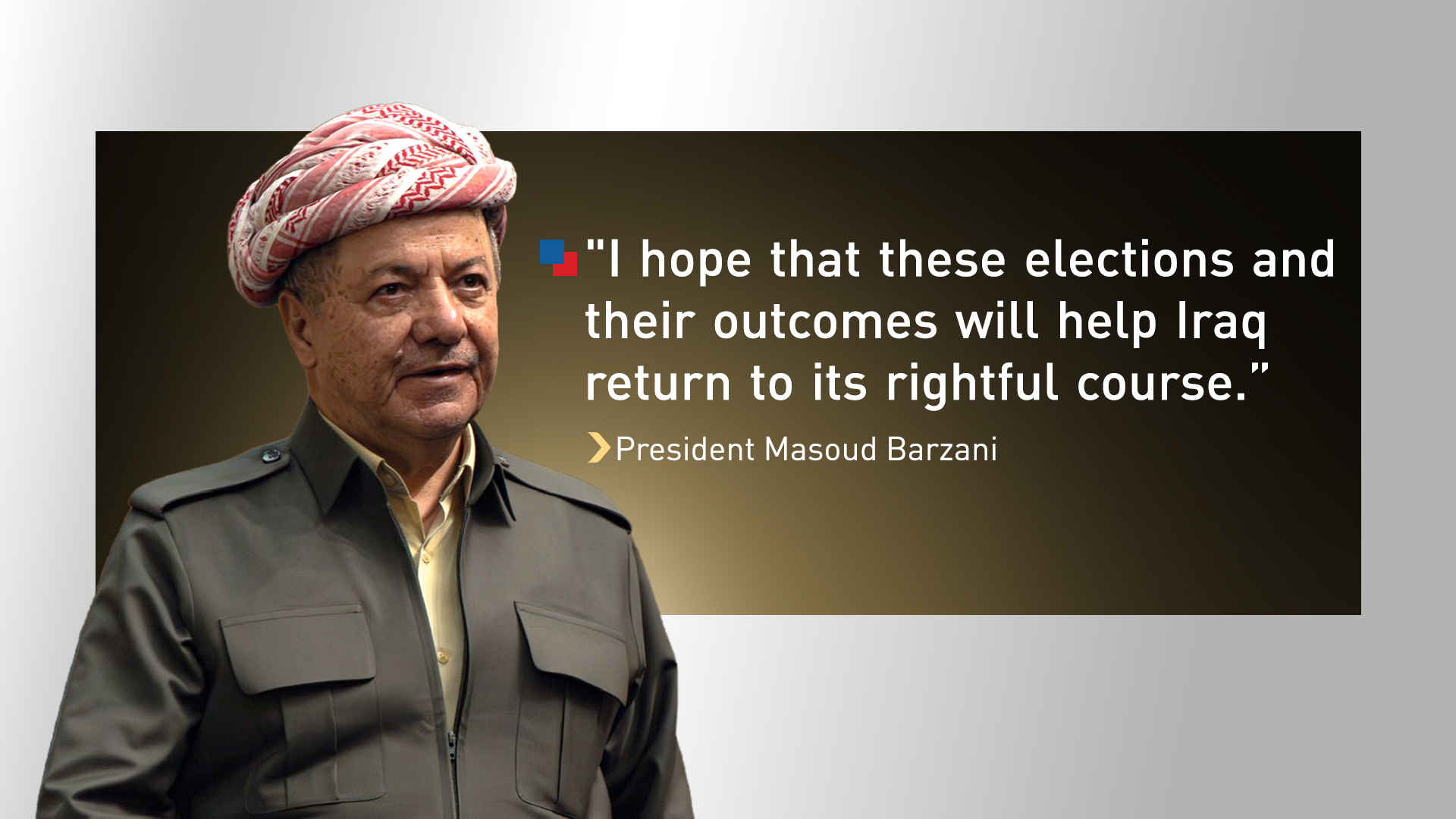President Masoud Barzani Congratulates People of Kurdistan and Iraq on Successful Elections, Urges Return to “Right Path”
Barzani’s statement, while celebratory in tone, carried a broader political message. His call for Iraq to “return to its rightful path” reflects ongoing concerns about governance, corruption, and the imbalance of power between Baghdad and Erbil.

ERBIL (Kurdistan24) — Kurdish leader and President of the Kurdistan Democratic Party (KDP) Masoud Barzani on Wednesday extended heartfelt congratulations to the people of Kurdistan and Iraq on the successful completion of the parliamentary elections, praising the calm and secure environment in which the vote was conducted and expressing hope that the results would steer Iraq back onto the “right path.”
In his official statement, President Barzani said:
“In the name of God, the Most Merciful, the Most Compassionate,
On the occasion of the successful Iraqi parliamentary elections, I extend my sincere congratulations to the dear citizens of Kurdistan and all of Iraq.
I also offer my greetings to the families of the martyrs, the heroic Peshmerga, and all segments of society in Kurdistan.
I find it my duty to express gratitude to the leadership, members, cadres, and supporters of the Kurdistan Democratic Party, as well as to the security forces and all concerned parties, for their tireless efforts in ensuring a safe and peaceful environment for the electoral process.
I hope that these elections and their outcomes will help Iraq return to its rightful course.”
The message comes one day after Iraq’s Independent High Electoral Commission (IHEC) confirmed that the national voter turnout exceeded 55 percent, marking one of the highest participation rates in recent years.
The election, held in a relatively stable and transparent environment, drew international praise — including from the United Nations — for its orderly conduct and high voter engagement.
According to preliminary results obtained by Kurdistan24, the Kurdistan Democratic Party emerged as the top vote-getter nationwide, securing over 1,080,000 votes, far surpassing other parties across Iraq and the Kurdistan Region.
At the level of the Kurdistan Region provinces, the Patriotic Union of Kurdistan (PUK) followed with approximately 536,000 votes, while the Kurdistan Islamic Union (KIU), National Stance Movement (NSM), and New Generation Movement (NGM) came next in line.
This outcome reaffirmed the KDP’s dominant position as both the leading Kurdish and Iraqi political force, despite the constraints of Iraq’s multi-constituency electoral system, which many Kurdish leaders — including President Barzani — have criticized as structurally unfair to high-turnout regions like Kurdistan.
Barzani’s statement, while celebratory in tone, carried a broader political message. His call for Iraq to “return to its rightful path” reflects ongoing concerns about governance, corruption, and the imbalance of power between Baghdad and Erbil.
Over the past two decades, Iraq’s post-2003 political order has struggled to deliver stability and equitable power-sharing among its Shiite, Sunni, and Kurdish components.
Observers interpret Barzani’s remarks as both a message of unity and a reminder that Iraq’s progress depends on genuine partnership among its communities.
The KDP leader has consistently advocated for stronger federalism, respect for the Iraqi constitution, and full recognition of the Kurdistan Region’s constitutional rights — especially in matters related to budget, oil exports, and security coordination.
The 2025 elections come at a pivotal time for Iraq and the Middle East, as shifting alliances and economic challenges reshape regional politics. Prime Minister Mohammed Shia al-Sudani, seeking a second term, is expected to face complex coalition-building talks following a weaker-than-expected electoral performance.
His bloc reportedly won around 18 seats with fewer than 200,000 votes, compared to the KDP’s 29 seats earned with over a million votes.
Such disparities have reignited debate about electoral fairness and representation — issues central to Barzani’s political agenda. Kurdish leaders have urged Baghdad to amend the election law to better reflect population density and voter participation levels across provinces.
Meanwhile, the United Nations Secretary-General, António Guterres, congratulated Iraq on the peaceful conduct of the polls and emphasized the importance of a “timely and inclusive government formation process that reflects the will of the Iraqi people and their aspirations for stability and development.”
President Barzani’s message underscores a broader optimism within Kurdistan following the elections, where participation was notably high and the political atmosphere largely stable.
For many observers, the Kurdish leader’s tone suggested both confidence in his party’s mandate and a renewed call for national cooperation.
As Iraq’s political blocs now enter negotiations to form a new government, Barzani’s emphasis on peace, partnership, and reform resonates as a reminder that Iraq’s stability — and its democratic future — depend on a shared commitment to the principles of inclusion, dialogue, and constitutional balance.